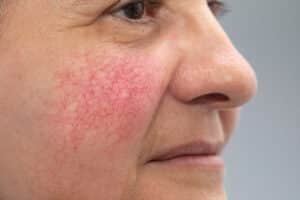Why Cold Weather Can Cause Rosacea Flare-Ups
 As the temperature drops and the cold weather sets in, many people with rosacea find themselves dealing with flare-ups, which can lead to redness, irritation, and discomfort.
As the temperature drops and the cold weather sets in, many people with rosacea find themselves dealing with flare-ups, which can lead to redness, irritation, and discomfort.
While rosacea is a chronic skin condition that primarily affects the face, its triggers vary from person to person. Cold weather is a common culprit, and many of our patients ask why it can cause rosacea flare-ups.
Understanding common environmental factors that exacerbate rosacea symptoms can help you manage the condition well.
Skin Sensitivity to Temperature Changes
Rosacea causes blood vessels to dilate easily, leading to the characteristic redness and flushing of the skin. When exposed to extreme temperature changes, these blood vessels react more aggressively.
Cold air causes blood vessels to constrict, and when you move to a warmer environment, they dilate rapidly. This sudden fluctuation can lead to a rosacea flare-up, causing redness and irritation in the affected areas.
Dry, Harsh Air
Dry air is typically found both inside and outside during cold weather. Low moisture content in the air can deprive the skin of its natural oils, causing dryness and irritation.
With the function of the skin barrier already weakened, the dry air might exacerbate rosacea sensitivity. During colder months, redness and dry, flaky skin are classic signs of rosacea flare-ups.
Reduced Blood Circulation
Cold weather causes blood vessels to constrict as part of the body’s natural response to preserve heat. This reduced blood circulation can affect the skin’s ability to heal or maintain a healthy, moisturized appearance.
For people with rosacea, this can lead to irritation and inflammation, making flare-ups more frequent and intense. When the blood vessels dilate again in warmer settings, they may become more sensitive and reactive. It can lead to visible redness and inflammation.
Book Your Rosacea Appointment in Chevy Chase, MD
Cold weather can be a major trigger for rosacea flare-ups, causing redness, dryness, and irritation. By understanding how the cold affects your skin, you can take steps to minimize flare-ups.
We can help you keep your skin comfortable and healthy during the winter months. If you find that cold weather consistently triggers rosacea, call us at 301-656-7546 and schedule a consultation with Chevy Chase Dermatology.
Category: Rosacea






